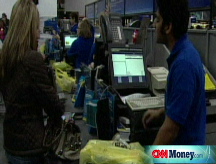The danger of keeping rates at zero
The Fed seems to think inflation is no longer a problem. But inflation may just be in hibernation and low rates for a long period of time could awaken the beast.
NEW YORK (CNNMoney.com) -- This is obviously a terrible time for the economy. For that reason, it made sense for the Federal Reserve to slash interest rates near zero last month.
But I'm starting to worry a bit that the Federal Reserve is willing to leave rates this low for too long and that this could spark inflation down the road.
In a speech in London Tuesday morning, Federal Reserve chairman Ben Bernanke defended the Fed's series of rate cuts since September 2007, saying that inflation was no longer a major concern. The Fed usually raises interest rates when it is worried about inflation.
"At this point, with global economic activity weak and commodity prices at low levels, we see little risk of inflation in the near term; indeed, we expect inflation to continue to moderate," he said.
Bernanke's speech comes one day after Federal Reserve Bank of Atlanta President Dennis Lockhart said that there has been a "substantial slowing of inflation." What's more, he hinted that rates could hover at this level for some time.
"I would argue that a federal funds rate this low will have considerable macroeconomic effect especially if accompanied by policies to improve the functioning of credit markets," he said in a speech in Atlanta Monday.
Yes, these are unprecedented times. And the Fed should be applauded for using every weapon in its arsenal -- and even creating a bunch of new ones -- to tackle the crisis.
What's more, with economies around the world suffering a severe recession, it is tempting to declare that inflation is dead. In fact, some economists are starting to worry more about deflation, a persistent decline in prices that could lead to further declines in industrial production, more job losses and even wage declines.
But inflation is not dead. I'd argue that it's merely in hibernation.
The combination of the economic stimulus package proposed by President-elect Obama, the Treasury Department's bank bailout, the Fed's rate cuts and its various lending programs could eventually lead to an awakening of the inflation beast. The Fed has to be mindful of that.
The government has to pay for all this spending somehow and the likely source of these funds, especially since tax cuts are a big part of the proposed stimulus, is probably going to be from new money printed by the Fed. And adding dollars into the system can't help but add to inflationary pressures.
"The bottom line is that the only way to get out of this recession is to spend a lot of money on stimulus and dump a lot of money into the economic system. That means there will be inflation for a long period of time," said David Beahm, vice president of economic research with Blanchard & Company Inc, a New Orleans-based investing firm that specializes in tangible assets like gold and other precious metals.
Bernanke suggested Tuesday that the rapid rise in oil and other commodities prices earlier last year was due to strong demand from emerging markets and that the precipitous decline in oil prices since the summer was largely due to lower global demand in the wake of the credit collapse.
Is that really the case though? Just as oil may have been irrationally high when it was above $140 a barrel, crude may also be trading at an artificially low price below $40 a barrel.
"Commodities won't go up as quickly as they did last year, which is healthy. But with all this money being dumped into the system to help the economy, it will allow companies to spend more and stimulate demand. That's when higher commodities come back into play," Beahm said.
If commodity prices shoot higher in the near future, that could add to inflationary concerns since it could lead to another round of higher gas prices and food prices.
Now don't get me wrong. I'm not arguing that the Fed raise interest rates at its next meeting later this month or even at the one following that. But the Fed needs to keep a close eye on what commodity prices are doing.
In particular, the Fed has to be careful to not allow the dollar to fall as dramatically as it did against the euro and other currencies earlier last year.
The weak greenback was caused, in part, by the Fed's interest rate cuts. That's because many other global central banks were not yet lowering their own rates. And the weak dollar added to the upward pressure on the price of oil and other imported goods and commodities.
Kathy Lien, director of currency research with GFT, a foreign exchange and futures brokerage firm, said this should be less of a problem now that the Bank of England and European Central Bank have joined the Fed in lowering rates. But with rates at zero in the U.S., Lien said many foreign investors may wind up fleeing the dollar, which could spark another round of inflation fears.
"What the Fed risks is a potential run on the dollar, with rates at zero it makes the dollar-denominated assets unattractive for foreign investors," she said.
Nonetheless, both Beahm and Lien think the Fed has done the right thing to lower rates. The issue though is to not keep them this low for an indefinite period of time.
"The Federal Reserve cannot afford to focus on inflation at this point. They have to focus on growth and deal with inflation later," Lien said. "But as the economy stabilizes, inflation will become a greater risk and it could pick up at a relatively rapid pace, which could force aggressive measures by the Fed."
Are you unemployed and using unconventional methods to find work? Tell us about it, and you could be included in an upcoming story. ![]()





